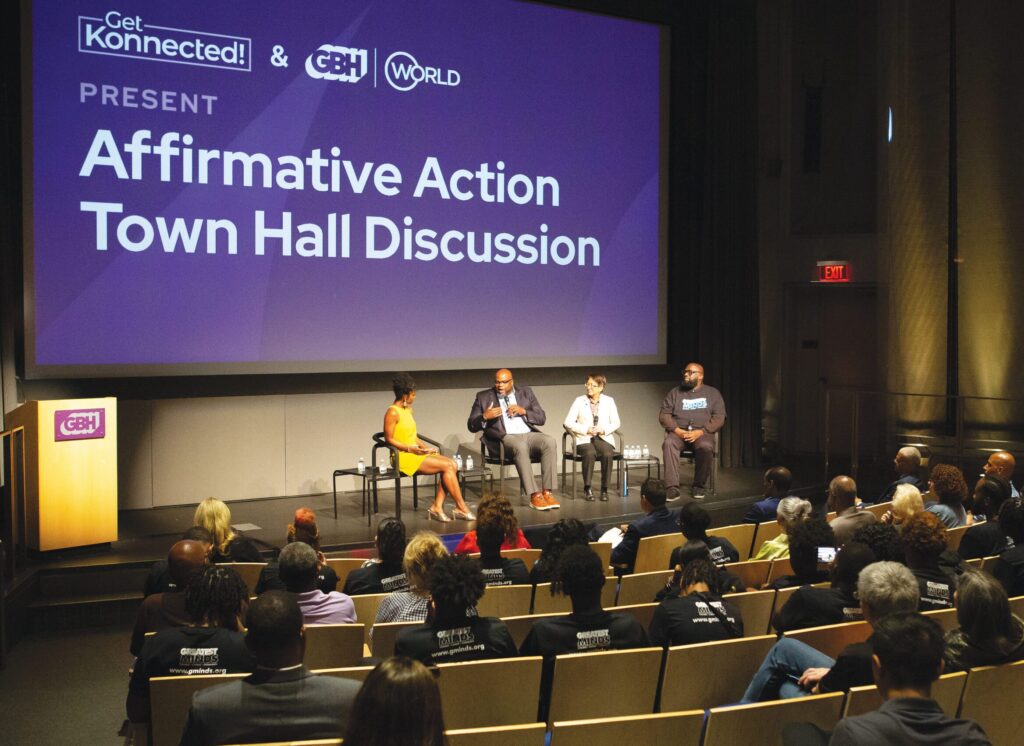
High school seniors of color could face a lot more challenges in both college applications and, longer term, hiring in the aftermath of the Supreme Court’s recent decision to ban race as a factor in college admissions.
That was the message from a town hall last week on the future after the affirmative action decision and how young people nationwide should prepare for success in the long term.
“We have a lot of resources up here, but we also [have to] look about our brothers and sisters all around this country,” said George “Chip” Greenidge Jr., founder and director of The Greatest Minds non-profit organization.

(from left) Paris Alston, GBH News; Brooke Thomson, president of Associated Industries of Massachusetts; Lee Pelton, president of the Boston Foundation; Ivan Espinoza-Madrigal, executive director, Lawyers for Civil Rights. PHOTO: GBH/PATRICIA ALVARADO NUÑEZ
Greenidge spoke during the town hall, which was hosted by Get Konnected!, a hub for cross-business connections, and GBH/WORLD. It was moderated by Paris Alston of GBH News’ Morning Edition.
The event featured two panels. One — titled “Is the Workforce Next?’’ — tackled the possibility of a ban on affirmative action in hiring practices. Panelists were Lee Pelton, president of the Boston Foundation; Ivan Espinoza-Madrigal, executive director for Lawyers for Civil Rights, and Brooke Thomson, president of Associated Industries of Massachusetts.
The other panel, titled “Helping Rising Seniors Now,” emphasized how the court’s affirmative action decision directly impacts how students should think about their college applications and how admissions boards should now consider their review of students. Massachusetts Secretary of Education Patrick Tutwiler and UMass-Lowell Chancellor Julie Chen joined Greenidge on that panel.
In a 6-3 ruling, the Supreme Court last month prohibited using race as a factor in college admissions in higher education at Harvard University and the University of North Carolina at Chapel Hill, effectively overturning more than 40 years of legal precedent.
Lawyers for Civil Rights promptly filed a federal civil complaint against Harvard alleging so-called “legacy” and donor preferences favors wealthy white applicants over their nonwhite counterparts.
Tutwiler said the affirmative action decision will present a nationwide challenge for motivating students to apply to college regardless of how they feel they will be reviewed in the admissions process.
Tutwiler said the Massachusetts Department of Education will expand the My Career and Academic Plan program — which empowers students — in public schools and will launch a marketing campaign to help “students and families navigate the trajectory of the college process.”
Greenidge, who brought students from his organization to the town hall meeting, said that despite the affirmative action ruling, there are organizations and resources dedicated to providing students with the academic support they need. He said young people should seek out enriching experiences such as shadowing mentors at their jobs or seeking internships, which could be helpful for writing college essays.
Chen expressed worry about pre-college programs, which give students the opportunity to see themselves at college. She added that the affirmative action decision may prohibit colleges from asking program applicants about their race, which can impact who is admitted.
She advocated for a holistic admissions process that diversifies programs. “We have to rethink …how to get that information, [and] about who will benefit from these programs with our goal of diversity,” she said.
One example is to tell students to emphasize who they are — race and ethnicity included — in their applications to college. “Ultimately, that gives information beyond just a box on the application,” she added.







